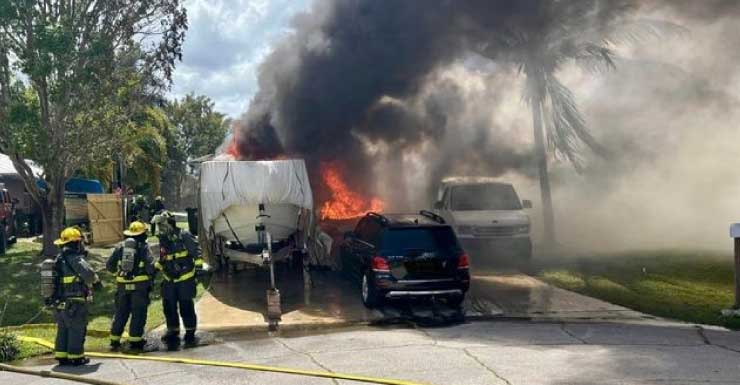18 Fla. L. Weekly Supp. 758a
Online Reference: FLWSUPP 1809DONA
Insurance — Personal injury protection — Coverage — Medical expenses — Reasonable, related and necessary treatment — Directed verdict — Error to deny medical provider’s motion for directed verdict on issue of medical necessity of treatment where provider presented expert testimony that treatment was necessary, insurer did not present countervailing expert testimony, and insurer did not severely impeach provider’s expert with second medical report that differed in what expert termed “minutia” — Appellate court is unable to review trial court’s denial of directed verdict in favor of provider on issue of reasonableness of bills where pertinent portions of transcript have not been included in record — However, where jury failed to reach issue of reasonableness, case is remanded for factual determination on issue
AFFILIATED HEALTHCARE CENTERS, INC., a/a/o FRANCIS DONALDSON, AS GUARDIAN FOR UTIVA TURNER, Appellant, vs. UNITED AUTOMOBILE INSURANCE COMPANY, Appellee. Circuit Court, 11th Judicial Circuit (Appellate) in and for Miami-Dade County. Case No. 09-624 AP. Trial Case No. 05-008232 SP 23. June 22, 2011. On appeal from the County Court for Miami-Dade County, Linda S. Stein, Judge. Counsel: Marlene S. Reiss, Marlene S. Reiss, P.A., for Appellant. Lara J. Edelstein, United Automobile Insurance Company, Office of the General Counsel, for Appellee.
(Before MUIR, BERNSTEIN, and BLOOM, JJ.)
(BERNSTEIN, Judge.) Affiliated Healthcare Centers, Inc. appeals a final judgment after jury verdict entered by the trial court in favor of United Automobile Insurance Company. We have jurisdiction pursuant to Florida Rule of Appellate Procedure 9.030(c)(1)(A).
I. Facts
United Auto insured Francis Donaldson for personal injury protection (PIP) under an insurance policy which was in effect when her nine-year old daughter, Utiva Turner, was injured in an automobile accident on April 18, 2004. Utiva Turner sought treatment from Affiliated for injuries sustained to her spine. Affiliated, as assignee for Francis Donaldson, submitted bills to United Auto totaling $2,860.001 for Miss Turner’s treatment. United Auto did not pay any of the bills. As a result, Affiliated filed suit against United Auto to recover PIP insurance benefits.
At trial, Affiliated presented expert testimony from Dr. Alejandro Duran, D.C., who testified that, based on his experience and review of the medical records, Miss Turner’s injuries were related to the accident, all treatment rendered was medically necessary, and the amount billed was reasonable. During cross-examination of Dr. Duran, United Auto introduced into evidence another medical report, different from the one Dr. Duran reviewed in Affiliated’s medical records. Both reports were signed by Dr. Barry Burak and both listed the same report date. United Auto questioned Dr. Duran on the differences between the two reports. Dr. Duran testified that he could not verify the accuracy of either report, that one had findings not included in the other, and that one was indeed more detailed than the other. But Dr. Duran testified that any differences in the two reports were “minutia.” Dr. Duran further testified there were “positive findings” towards treatment in both reports (i.e., Miss Turner had pain and a decreased range of motion), and both reports would indicate the same treatment.2 Subsequently, on redirect examination, Dr. Duran explained Affiliated’s procedure for the preparation of reports.3 He also reiterated that the course of treatment provided to Miss Turner would have been exactly the same in light of either report. The trial judge then asked Dr. Duran questions submitted by the jury, including: “[h]ow can the information on the reports have changed if it is based on someone typing it from a doctor’s dictation?” Dr. Duran responded, in pertinent part:
When you have multiple people handling reports and paperwork, it is very easy to make clerical errors. The importance here was the difference in the ranges of motion is nothing significant. I have a patient with pain. She has a decreased range of motion meaning when she bends over she has pain at a certain point which she shouldn’t. Treatment doesn’t change. It doesn’t vary from five degrees of range of motion. That is minutia.
II. Directed Verdict
At the conclusion of all the evidence, Affiliated moved for a directed verdict on reasonableness, necessity, and relatedness, arguing that United Auto presented no medical testimony to contradict that of Dr. Duran. United Auto countered that Dr. Duran was sufficiently impeached and the matter should be given to the jury. The trial court granted Affiliated’s motion for a directed verdict on the issue of relatedness.4 The trial court denied Affiliated’s motion, however, on the issues of medical necessity and reasonableness and allowed submission of those two issues to the jury. The jury returned a verdict in favor of United Auto. The verdict form submitted to the jury instructed them to answer the first question, “[a]re any of the services medically necessary?” and then stated that, if the answer was no, to “go no further.” Accordingly, the jury answered the first question “no” and never reached the second question about the reasonableness of the bills. Affiliated then moved for a judgment notwithstanding the verdict, or alternatively a new trial, which the trial court denied. The trial court entered a final judgment in favor of United Auto, and this appeal follows.
On appeal, Affiliated argues that the trial court erred by denying its motion for a directed verdict on the medical necessity of the services and the reasonableness of its bills. Affiliated argues United Auto never presented any evidence to counter Affiliated’s expert, who testified that the treatment was medically necessary and the bills were reasonable. Affiliated also argues United Auto did not “severely” impeach Affiliated’s expert. United Auto asserts that Affiliated’s failure to provide a complete trial transcript precludes appellate review pursuant to Applegate v. Barnett Bank of Tallahassee, 377 So. 2d 1150 (Fla. 1979). Additionally, United Auto asserts that unless there is an error on the face of the order under review, the final judgment should be affirmed. In the alternative, United Auto asserts that the trial court properly ruled that the two different examination reports created an issue for the jury as to the medical necessity of the treatment rendered and the reasonableness of the bills.
III. Transcripts
In appellate proceedings, the decision of a trial court has the presumption of correctness and the burden is on the appellant to demonstrate error. Applegate, 377 So. 2d at 1152. “It is the responsibility and duty of the appellant to provide the appellate court with a record sufficient to review the matter assigned as error.” S. Fla. Apartment Ass’n, Inc. v. Dansyear, 347 So. 2d 710, 711 (Fla. 3d DCA 1977). Moreover, Florida Rule of Appellate Procedure 9.200(b)(1) requires the appellant to “designate those portions of the proceedings not on file deemed necessary for transcription and inclusion in the record.” The appellee may then “designate additional portion of the proceedings.” Affiliated provided us with those portions of the record which permit us to review the issue of medical necessity. We find the trial court erred in denying Affiliated’s motion for directed verdict on the issue of medical necessity and reverse, for the reasons detailed in section IV of this opinion. We find, however, that Affiliated failed to provide those portions of the transcript containing the testimony of Affiliated’s records custodian and billing clerk. Without those portions of the transcript, we cannot review the issue of reasonableness of the bills. See Applegate, 377 So. 2d at 1152 (finding that without a record of the trial proceedings, the appellate court can not properly review the underlying factual issues to conclude whether the trial court’s judgment is supported by the evidence). Had we been provided a complete transcript, we might have been able to determine whether the trial court was wrong in denying a directed verdict on the issue of reasonableness. Since we were not given the entire transcript, however, we must therefore affirm the trial court’s denial of a directed verdict on this issue. But since the jury never reached the issue of reasonableness either, we have no choice but to remand the matter to the trial court for a factual determination on the issue of reasonableness.
IV. Medical Necessity
The standard of review of a trial court’s ruling on a motion for directed verdict is de novo, in which we apply the same test used by the trial court in ruling on the motion. Fell v. Carlin, 6 So. 3d 119, 120 (Fla. 2d DCA 2009) [34 Fla. L. Weekly D171a]. A trial court should grant a motion for directed verdict when the evidence, viewed in the light most favorable to the non-moving party, shows that a jury could not reasonably differ about the existence of a material fact and the movant is entitled to judgment as a matter of law. Meruelo v. Mark Andrew of Palm Beaches, Ltd., 12 So. 3d 247, 250 (Fla. 4th DCA 2009) [34 Fla. L. Weekly D907a]. Courts are prohibited from passing on the credibility of witnesses or weighing the evidence in ruling on the motion. Powell v. Napilitano, 578 So. 2d 747, 748 (Fla. 2d DCA 1991).
The trial court denied the motion for directed verdict on the issue of medical necessity finding that “[medical] necessity goes to the differences in the two reports.” This was improper; the mere fact that there were two reports does not necessarily create a jury issue. Evaluating the evidence in the light most favorable to United Auto, and deducting all reasonable inferences therefrom, no proper view of the evidence could sustain a verdict in favor of United Auto.
United Auto is responsible for providing PIP benefits for medically necessary services. § 627.736(1)(a), Fla. Stat. (2005). Section 627.732(2), Florida Statutes (2005) provides the following definition:
“Medically necessary” refers to a medical service or supply that a prudent physician would provide for the purpose of preventing, diagnosing, or treating an illness, injury, disease, or symptom in a manner that is:
(a) In accordance with generally accepted standards of medical practice;
(b) Clinically appropriate in terms of type, frequency, extent, site, and duration; and
(c) Not primarily for the convenience of the patient, physician, or other health care provider.
Therefore, the status of services as “medically necessary” must be proffered by expert medical testimony in order to establish a prima facie case. See Jarrell v. Churm, 611 So. 2d 69, 70 (Fla. 4th DCA 1992). The party seeking to contest an expert opinion on a medical diagnosis must either: (1) present countervailing expert testimony; (2) severely impeach the proponent’s expert; or (3) present other evidence which creates a direct conflict with the proponent’s evidence, in order to carry the issue to the jury. Id. If there is conflicting evidence, a jury is then free to determine the credibility of expert testimony and decide what weight should be ascribed to the testimony. See Easkold v. Rhodes, 614 So. 2d 495 (Fla. 1993).
Affiliated presented expert testimony from Dr. Duran that the treatment was medically necessary. United Auto offered no “countervailing” expert testimony; in fact, it called no witnesses at all. United Auto did not “severely” impeach Dr. Duran, who never waivered from his opinion that the treatment provided to Miss Turner was medically necessary. And United Auto never presented any other evidence which created a “direct conflict” with Dr. Duran’s expert testimony. All United Auto offered was another medical report which contained different detail (the expert called it “minutia”) than the one Dr. Duran reviewed, but from which he reached the exact same conclusion — that the treatment Miss Turner received was medically necessary under either report. These two medical reports, even if there were minute differences, do not create a “conflict in the evidence” or serve to “severely impeach” the expert’s testimony.5
Because Affiliated’s evidence was uncontradicted, it was required to be believed and not disregarded. See Ryan v. Atlantic Fertilizer & Chemical Co., 515 So. 2d 324, 325 (Fla. 3d DCA 1987). Therefore, the jury’s verdict finding that the services were not medically necessary was against the manifest weight of the evidence. When the manifest weight and probative force of the evidence clearly requires a verdict for one party and the evidence is legally insufficient to support a verdict for the opposing party on a particular issue, it is the trial court’s duty to direct a verdict. McAllister v. Miami Daily News, 17 So. 2d 613, 614 (Fla. 1944). Affiliated was entitled to a directed verdict on the issue of medical necessity of the services.
V. Conclusion
The final judgment entered for United Auto should be reversed and the matter remanded to the trial court for (1) a directed verdict for Affiliated on the issue of medical necessity, and (2) a factual determination of whether the medical bills were reasonable.
We also find that Affiliated is entitled to an award of appellate attorney’s fees and instruct the trial court to take evidence and fashion an award of appellate fees. Fla. R. App. P. 9.400(b); See also Great Southwest Fire Ins. Co. v. DeWitt, 458 So. 2d 398 (Fla. 1st DCA 1984).
AFFIRMED IN PART, REVERSED IN PART and REMANDED for proceedings consistent with this opinion. (MUIR and BLOOM, JJ., concur.)
__________________
1Utiva Turner received treatment during the period beginning April 26, 2004 and ending November 8, 2004 for a total of seven visits.
2Dr. Duran also testified Miss Turner reported a medical history of seizures and asthma and it was not necessary for him to know Miss Turner’s specific seizure disorder because her history of seizures was completely unrelated to her complaints and treatment provided by Affiliated.
3Dr. Duran worked at Affiliated during the time Miss Turner received her treatment.
4United Auto has not appealed this ruling.
5We do not reach the issue whether any inconsistency in the medical records affects the reasonableness of the bills charged.




 how can I help you?
how can I help you?